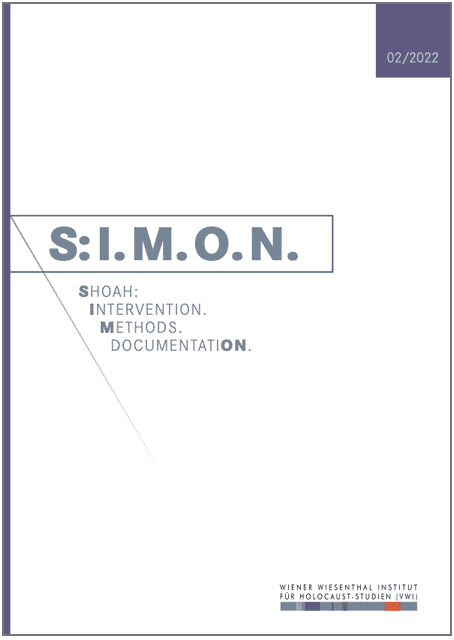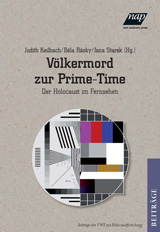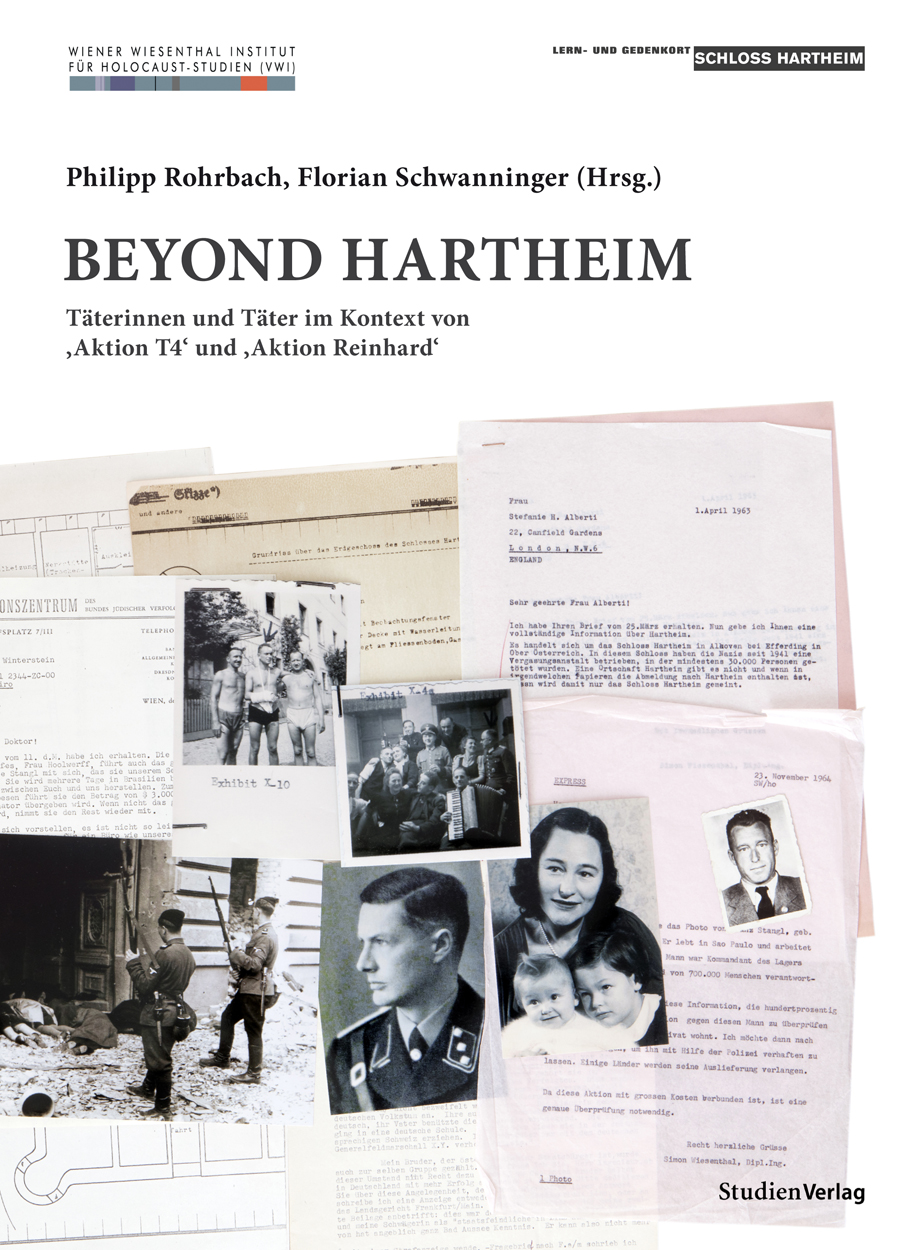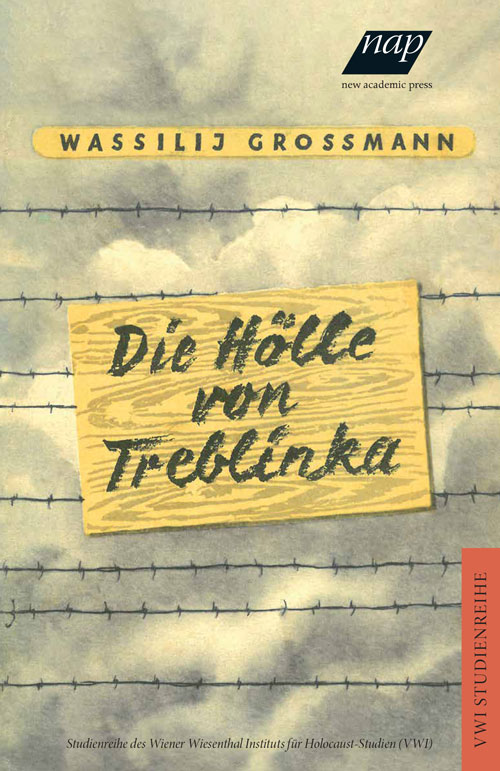News – Events – Calls
| 24. April 2024 19:00 BuchpräsentationIngeborg Bachmann, Marie Luise Kaschnitz, Hilde Domin, Nelly Sachs: Über Grenzen sprechend. Briefe. Piper/Suhrkamp, München, Berlin, Zürich 2023Ingeborg Bachmann stand mit zentralen Protagonistinnen der deutschsprachigen Literatur im Austausch, nun werden ihre Briefwechsel mit Marie Luise Kaschnitz, Hilde Domin und Nelly Sachs erstmals zugänglich gemacht. Die Briefe geben Einblick in die Lebensbedingungen, das literarische S...Weiterlesen... |
| 02. May 2024 18:30 Simon Wiesenthal LectureEdyta Gawron: Never Too Late to Remember, Never Too Late for Justice! Holocaust Research and Commemoration in Contemporary PolandIn 1994, Simon Wiesenthal received a doctorate honoris causa from the Jagiellonian University in Krakow for his lifelong quest for justice – half a century after he had been, for a short time, prisoner of the local Nazi Concentration Camp (KL) Plaszow. The 1990s were the decade when t...Weiterlesen... |
| 07. May 2024 00:00 - 04. June 2024 00:00 WorkshopDealing with Antisemitism in the Past and Present. Scientific Organisations and the State of Research in AustriaThis series of talks, presented by antisemitism experts from different organisations that research antisemitism using a variety of academic approaches, aims to provide a snapshot of historical evolutions, current events, prevalent perceptions and declared (and undeclared) attitudes. I...Weiterlesen... |
| 14. May 2024 08:45 - 16. May 2024 16:30 TagungQuantifying the Holocaust. Classifying, Counting, Modeling: What Contribution to Holocaust History? About the conference: https://quantiholocaust.sciencesconf.org/ Programme timed on the basis of 15-minute presentations + 15-minute discussions; short breaks and lunches Day 1 Tuesday, 14 May 2024Centre Malher (9 rue Malher 75004 Paris/amphi Dupuis) From 8.45 am: Welcome9.30 am...Weiterlesen... |
| 24. May 2024 18:00 InterventionLange Nacht der Forschung 20242024 öffnet das Wiener Wiesenthal Institut für Holocaust-Studien (VWI) in der Langen Nacht der Forschung wieder seine Tore und lädt Interessierte in seine Räumlichkeiten am Rabensteig 3 ein. Im Rahmen von Vorträgen, Podiumsdiskussionen und Präsentationen bieten VWI-Team und Gäste Einb...Weiterlesen... |
The Future of Memory – Museum Simon Wiesenthal
1010 Vienna
Rabensteig 3
Free entry
Group registration under
This email address is being protected from spambots. You need JavaScript enabled to view it.
Opening hours
September-June:
Monday-Friday: 10:00-18:00
(closed on holidays)
July and August:
Monday-Friday: 10:00-16:00
(closed on holidays)
Please bring an ID with you.
A small museum in the VWI building at Rabensteig 3, 1010 Vienna, commemorates the life of Simon Wiesenthal, his legacy, his work – and thus constitutes the foundation of the scholarly, documentary, and educational work of the Vienna Wiesenthal Institute for Holocaust Studies (VWI). As a survivor, Wiesenthal dedicated his life under enormous psychological pressures and despite many enmities to the investigation of Nazi crimes, the search for the perpetrators, and the struggle against forgetting.
The first room shows a short film of Lemberg in 1939, which played an important role for the young Simon Wiesenthal as he lived here with his wife Cyle and worked there as an architect before becoming caught up in the Nazi machine. These are the last moving records of Jewish Lemberg before its annihilation, which was surely one of many reasons for his later work.
Four objects – a magnifying glass, an address book, a gun holster, and the nameplate of the “Association of Jewish Victims of the Nazi Regime” – refer to his fastidious efforts, his networks, the dangerous environment, and the site of his activity respectively. Photographs present him reading or on the telephone as a researcher and communicator who knew how to intervene with phone calls, letters, and resolutions, who organised and published. A reproduction of the map from his office also hangs here, depicting the concentration and extermination camps and revealing the extent of the annihilation.
The second room is dedicated to the philosophy and selected cases of Wiesenthal, who always spoke of his dual responsibility: toward the victims, for whom he wanted to be a voice, and toward the coming generations, who must be enlightened. Film extracts reveal his thinking, offer insights into the conflicts which burdened his life in Austria, and show his telegenic demeanour and strong charisma. A touchscreen about Nazi criminals also provides information on the sluggish post-war justice in Austria and a public that ranged from indifferent to hostile.
The final room displays the perspectives on Simon Wiesenthal that were polarised until the 1980s: on the one hand the ones that through video sequences depict his contested image in an Austria that did not wish to confront its past, and on the other hand the ones that depict a personality revered and respected throughout the world. The mission statement of the Institute in itself reflects the change of heart among wide parts of Austrian society, and moreover refers to the activities of the Institute. The issue emerging here is “The Future of Memory”. A reading corner with publications of and about Wiesenthal, an installation on the events of the VWI, and a showcase with an “Object of the Quarter” from the VWI archive are all tied into an atrium which connects the various parts of the building, and thus the various tasks of the VWI – research, documentation, dissemination.
Further personal effects of Simon Wiesenthal can be found throughout the publicly accessible spaces of the house, symbolising that his spirit, his creative energy, his vigour, his fastidiousness, his aspirations, and his sense of justice remain the driving forces of his Institute.
Curators: Werner Michael Schwarz, Susanne Winkler
Curatorial Assistance: Sandro Fasching
Design: Alexander Kubik
Cabinet Construction: Wolfgang Ute
Graphics: David Schuller
Video Editing: Patrick Spanbauer, On Screen
Touchscreen Assembly & Software Development: Helmut Heiland
Media Technology: Günther Baronyai-Schiebeck, cat-x
Production: Béla Rásky
Translation: Tim Corbett
Contact
Vienna Wiesenthal Institute for Holocaust Studies (VWI)
Rabensteig 3, 1010 Vienna, Austria
Tel.: +43-1-890-15-14-0
E-Mail: This email address is being protected from spambots. You need JavaScript enabled to view it.
Office hours
Monday-Friday: 10:00-17:00
Opening hours of the library
Tuesday: 13:00-17:00
Thursday: 10:00-14:00
Phone: +43-1-890-15-14-300
E-Mail: This email address is being protected from spambots. You need JavaScript enabled to view it.
Opening hours of the archive
Monday: 9-13
Tuesday: 9-13
Wednesday: 11-15
To visit or use the archive a registration is required.
E-Mail: This email address is being protected from spambots. You need JavaScript enabled to view it.
Opening hours of The Future of Memory – Museum Simon Wiesenthal
September-June:
Monday-Friday: 10:00-18:00
(closed on holidays)
July and August:
Monday-Friday: 10:00-16:00
(closed on holidays)
Phone: +43-1-890-15-14-160
E-Mail: This email address is being protected from spambots. You need JavaScript enabled to view it.










